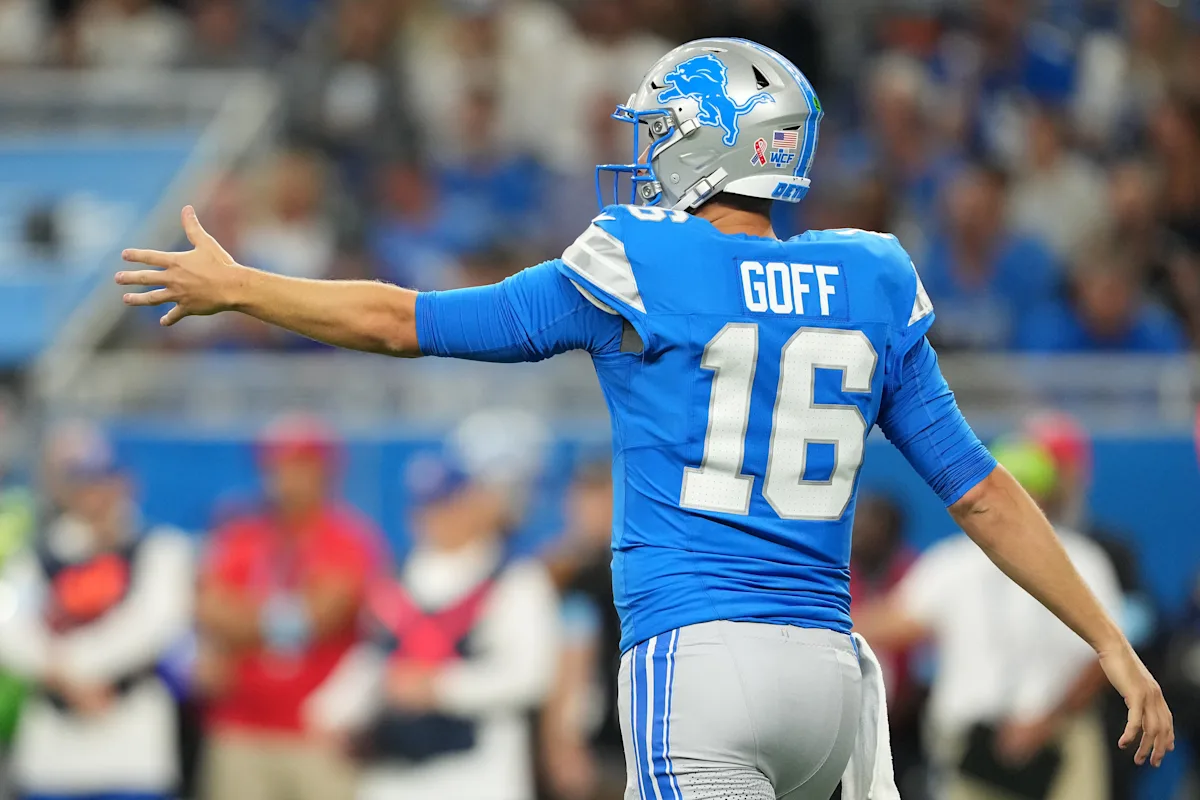The Detroit Lions lose to the Tampa Bay Buccaneers because of their first-half errors.
The Detroit Lions were handed another painful reminder of the importance of playing a complete game as they suffered a tough loss to the Tampa Bay Buccaneers on Sunday afternoon. Despite a resilient second-half performance, the Lions were haunted by first-half mistakes that ultimately proved to be their downfall. In a matchup that showcased flashes of brilliance alongside frustrating errors, Detroit’s inability to overcome an early deficit resulted in a 31-24 defeat. The game served as a harsh lesson for the Lions: it’s not enough to fight back after falling behind, you must avoid digging yourself into a hole in the first place.
Heading into the game with an impressive record, the Lions were hoping to keep their momentum going and stay within striking distance of playoff contention. Meanwhile, the Buccaneers, led by quarterback Tom Brady, had also been striving for consistency in what was shaping up to be a competitive NFC race. Detroit, known for its explosive offense and gritty defense, had an opportunity to prove its worth against a veteran team like Tampa Bay, but mistakes early on derailed their hopes for victory.
A Rocky First Half Sets the Tone
The first half of the game was a complete disaster for the Lions. From missed opportunities to sloppy execution, the opening two quarters were a struggle that Detroit could never truly recover from. The offense, typically explosive and sharp under quarterback Jared Goff, was out of sync, while the defense couldn’t seem to get stops when it mattered most.
The Buccaneers wasted little time in asserting their dominance. On the opening drive of the game, Tampa Bay marched down the field with relative ease, mixing up their offensive play calling and exploiting the Lions’ defensive vulnerabilities. Running back Leonard Fournette found the end zone on a short-yardage carry, and just like that, the Lions were down 7-0. For a team that had prided itself on its defensive improvements this season, giving up an easy touchdown early on was a bitter pill to swallow.
While the Lions offense had a chance to respond, they failed to capitalize. Goff, who had been playing some of the best football of his career, seemed rattled in the face of Tampa Bay’s pass rush. An early interception didn’t help matters either, as Goff made an uncharacteristic throw under pressure. This turnover led directly to another Buccaneers touchdown, with Brady connecting with wide receiver Mike Evans for a 20-yard score. Now down 14-0, Detroit found itself in an early hole that would only deepen in the first half.
The mistakes didn’t stop there. The Lions’ special teams unit, which had been a bright spot earlier in the season, faltered when it was needed most. A botched punt return gave the Buccaneers excellent field position, and they capitalized by putting up a field goal, extending their lead to 17-0. Detroit had been in control of its destiny going into the game, but now they were on the ropes, facing a daunting first-half deficit.
A Brief Glimmer of Hope Before the Break
Despite the first-half struggles, there was a brief glimmer of hope for the Lions just before halftime. Down 17-0, Detroit finally started to put together a solid drive. Goff, settling into a rhythm, connected with wide receiver Amon-Ra St. Brown on a critical third-down play to keep the drive alive. The offense slowly started to click, and after a series of short, efficient plays, running back D’Andre Swift punched the ball into the end zone, making it 17-7.
Though the Lions’ first-half woes weren’t entirely erased, the touchdown gave them a much-needed confidence boost heading into the break. The team had shown that they were still capable of scoring when they played to their potential, but the question remained: could they sustain that level of play for an entire half?
The Second Half: A Strong Comeback Attempt
The second half of the game featured a much more determined and competitive Lions team. They entered the third quarter with a clear sense of urgency, and the coaching staff seemed to have made the necessary adjustments during the break. The defense started to show some signs of life, forcing Tampa Bay to punt and limiting their offensive production on key drives.
On the offensive side of the ball, the Lions appeared to have found their rhythm. Goff, after a shaky start, began to look more comfortable in the pocket, making accurate throws and spreading the ball around to his receiving corps. Tight end T.J. Hockenson, who had been quiet in the first half, became a key target in the passing game. On one crucial drive, Goff connected with Hockenson for a 25-yard gain, setting up a short-yardage touchdown run for Swift. With the score now 17-14, the Lions had officially clawed their way back into the game.
The defense also played a critical role in the Lions’ comeback attempt. While Brady and the Buccaneers’ offense had been efficient in the first half, they became more stagnant in the second half. Detroit’s pass rush started to heat up, and they generated some much-needed pressure on Brady. The Lions’ secondary, which had been suspect early on, was tighter on coverage, forcing the Buccaneers to settle for field goals rather than touchdowns.
The game had truly turned into a back-and-forth battle. However, the Lions’ quest to overcome the deficit was once again stifled by key mistakes. After closing the gap to just three points, Detroit had a chance to tie the game or take the lead, but their drive stalled out in the red zone. A costly false start penalty on the offensive line pushed them back, and Goff was unable to connect with Hockenson in the end zone on a crucial third-and-long. The Lions settled for a field goal attempt, but kicker Austin Seibert’s 43-yard kick was blocked, leaving the score at 17-14 in favor of the Buccaneers.
Tampa Bay Capitalizes on Lions’ Mistakes
While the Lions had been improving in the second half, they were still not playing mistake-free football. With the momentum swinging in their favor, a missed opportunity for the tie was a costly one. Tampa Bay, sensing the Lions’ vulnerability, quickly responded with an efficient offensive series, culminating in a touchdown from Fournette, who found the end zone for the second time in the game. The Buccaneers now had a 24-14 lead, and Detroit was running out of time.
The Lions’ offense kept fighting, with Goff continuing to find his targets downfield. St. Brown, in particular, became a focal point of the offense, making several crucial catches to move the chains. But the Buccaneers’ defense bent but didn’t break. Despite Detroit’s efforts to drive the ball down the field and close the gap, Tampa Bay’s defense made key stops when they were needed most.
Late in the game, the Lions found themselves down 31-14. Despite another quick touchdown that made it 31-24, it was too little, too late. The clock ran out on Detroit’s comeback attempt, and the Buccaneers were able to hold on for the win.
What Went Wrong for the Lions?
The loss to the Buccaneers was a tough pill to swallow for Detroit. While the team showed resilience and made a strong effort in the second half, their first-half mistakes proved too much to overcome. Here are the key takeaways from the game:
-
Slow Start: The Lions’ inability to get off to a fast start was the most glaring issue. Mistakes in all three phases—offense, defense, and special teams—allowed the Buccaneers to jump out to a commanding 17-point lead early on. The Lions couldn’t afford to give away a half like they did, especially against a team as experienced as Tampa Bay.
-
Turnovers: Detroit’s turnover issues were another major factor in their loss. Goff’s interception in the first half gave the Buccaneers excellent field position, leading to another touchdown. The Lions’ offense needs to take better care of the ball and avoid mistakes in critical moments.
-
Penalties: The Lions committed several penalties that stalled offensive drives and gave the Buccaneers free yardage. False starts, holding calls, and defensive offsides penalties all contributed to Detroit’s inability to sustain drives and get back into the game.
-
Missed Opportunities: Despite their valiant effort in the second half, the Lions couldn’t capitalize on key scoring opportunities. Whether it was a missed field goal or failed red-zone opportunities, Detroit left points on the board, which ultimately proved to be their undoing.
The Detroit Lions fought hard and showed character in the second half, but their first-half mistakes proved to be too much to overcome in their 31-24 loss to the Tampa Bay Buccaneers. The game will undoubtedly serve as a reminder of how crucial it is to play a complete game in the NFL. As the Lions prepare for the rest of the season, they will need to eliminate these early-game mistakes and capitalize on every opportunity if they hope to remain competitive in a tough NFC. While the defeat is tough, there were moments of promise, and the Lions can take those positives with them as they look ahead to their next challenge.



